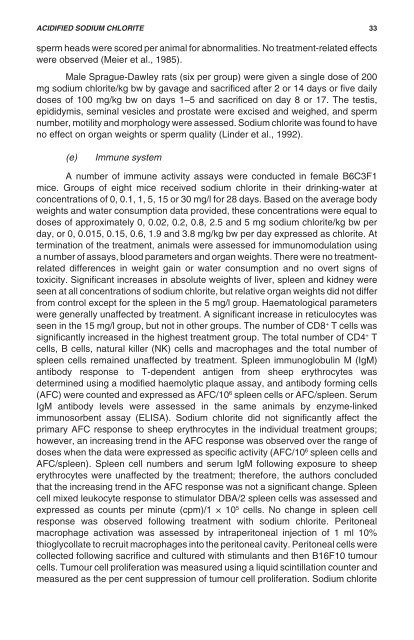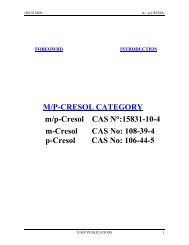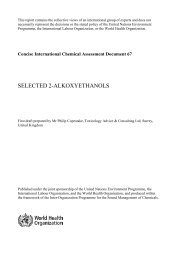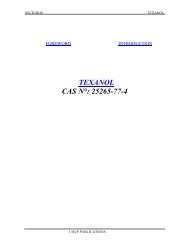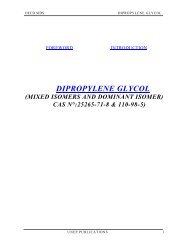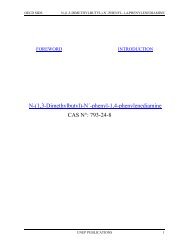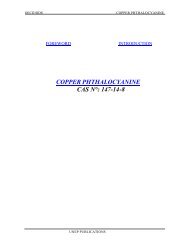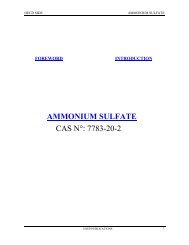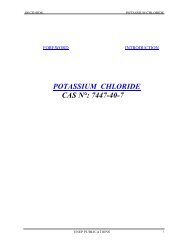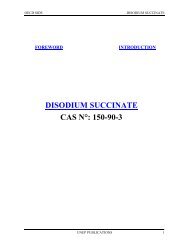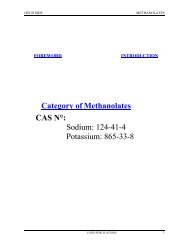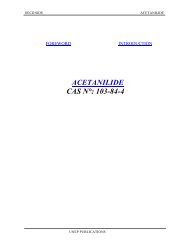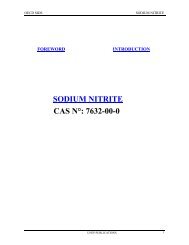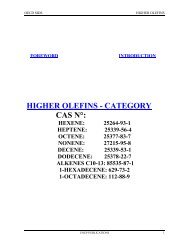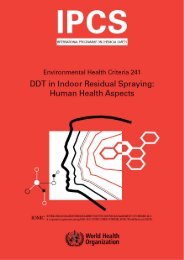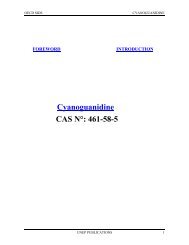- Page 2 and 3: WHO FOOD ADDITIVES SERIES: 59 Safet
- Page 4 and 5: CONTENTS Preface Specific food addi
- Page 6: PREFACE The monographs contained in
- Page 10 and 11: ACIDIFIED SODIUM CHLORITE First dra
- Page 12 and 13: ACIDIFIED SODIUM CHLORITE 5 The saf
- Page 14 and 15: ACIDIFIED SODIUM CHLORITE 7 (b) Sod
- Page 16 and 17: ACIDIFIED SODIUM CHLORITE 9 Methaem
- Page 18 and 19: ACIDIFIED SODIUM CHLORITE 11 Table
- Page 20 and 21: ACIDIFIED SODIUM CHLORITE 13 (b) So
- Page 22 and 23: ACIDIFIED SODIUM CHLORITE 15 Monkey
- Page 24 and 25: ACIDIFIED SODIUM CHLORITE 17 2.2.3
- Page 26 and 27: ACIDIFIED SODIUM CHLORITE 19 incide
- Page 28 and 29: ACIDIFIED SODIUM CHLORITE 21 Table
- Page 30 and 31: ACIDIFIED SODIUM CHLORITE 23 Table
- Page 32 and 33: ACIDIFIED SODIUM CHLORITE 25 agents
- Page 34 and 35: ACIDIFIED SODIUM CHLORITE 27 Sodium
- Page 36 and 37: ACIDIFIED SODIUM CHLORITE 29 Groups
- Page 38 and 39: ACIDIFIED SODIUM CHLORITE 31 relate
- Page 42 and 43: ACIDIFIED SODIUM CHLORITE 35 also r
- Page 44 and 45: ACIDIFIED SODIUM CHLORITE 37 result
- Page 46 and 47: ACIDIFIED SODIUM CHLORITE 39 approv
- Page 48 and 49: ACIDIFIED SODIUM CHLORITE 41 Table
- Page 50 and 51: ACIDIFIED SODIUM CHLORITE 43 The oc
- Page 52 and 53: ACIDIFIED SODIUM CHLORITE 45 Table
- Page 54 and 55: ACIDIFIED SODIUM CHLORITE 47 Agency
- Page 56 and 57: ACIDIFIED SODIUM CHLORITE 49 Dietar
- Page 58 and 59: ACIDIFIED SODIUM CHLORITE 51 Codex
- Page 60 and 61: ACIDIFIED SODIUM CHLORITE 53 Linder
- Page 62 and 63: ASPARAGINASE FROM ASPERGILLUS ORYZA
- Page 64 and 65: ASPARAGINASE FROM ASPERGILLUS ORYZA
- Page 66 and 67: ASPARAGINASE FROM ASPERGILLUS ORYZA
- Page 68 and 69: ASPARAGINASE FROM ASPERGILLUS ORYZA
- Page 70: ASPARAGINASE FROM ASPERGILLUS ORYZA
- Page 73 and 74: 66 CARRAGEENAN AND PROCESSED EUCHEU
- Page 75 and 76: 68 CARRAGEENAN AND PROCESSED EUCHEU
- Page 77 and 78: 70 CARRAGEENAN AND PROCESSED EUCHEU
- Page 79 and 80: 72 CARRAGEENAN AND PROCESSED EUCHEU
- Page 81 and 82: 74 CARRAGEENAN AND PROCESSED EUCHEU
- Page 83 and 84: 76 CARRAGEENAN AND PROCESSED EUCHEU
- Page 85 and 86: 78 CARRAGEENAN AND PROCESSED EUCHEU
- Page 87 and 88: 80 CARRAGEENAN AND PROCESSED EUCHEU
- Page 89 and 90: 82 CARRAGEENAN AND PROCESSED EUCHEU
- Page 91 and 92:
84 CARRAGEENAN AND PROCESSED EUCHEU
- Page 94 and 95:
CYCLOTETRAGLUCOSE AND CYCLOTETRAGLU
- Page 96 and 97:
CYCLOTETRAGLUCOSE AND CYCLOTETRAGLU
- Page 98 and 99:
CYCLOTETRAGLUCOSE AND CYCLOTETRAGLU
- Page 100 and 101:
CYCLOTETRAGLUCOSE AND CYCLOTETRAGLU
- Page 102 and 103:
CYCLOTETRAGLUCOSE AND CYCLOTETRAGLU
- Page 104 and 105:
CYCLOTETRAGLUCOSE AND CYCLOTETRAGLU
- Page 106 and 107:
CYCLOTETRAGLUCOSE AND CYCLOTETRAGLU
- Page 108 and 109:
CYCLOTETRAGLUCOSE AND CYCLOTETRAGLU
- Page 110 and 111:
CYCLOTETRAGLUCOSE AND CYCLOTETRAGLU
- Page 112 and 113:
CYCLOTETRAGLUCOSE AND CYCLOTETRAGLU
- Page 114 and 115:
CYCLOTETRAGLUCOSE AND CYCLOTETRAGLU
- Page 116 and 117:
CYCLOTETRAGLUCOSE AND CYCLOTETRAGLU
- Page 118 and 119:
ISOAMYLASE FROM PSEUDOMONAS AMYLODE
- Page 120 and 121:
ISOAMYLASE FROM PSEUDOMONAS AMYLODE
- Page 122 and 123:
ISOAMYLASE FROM PSEUDOMONAS AMYLODE
- Page 124:
ISOAMYLASE FROM PSEUDOMONAS AMYLODE
- Page 127 and 128:
120 PHOSPHOLIPASE A1 FROM FUSARIUM
- Page 129 and 130:
122 PHOSPHOLIPASE A1 FROM FUSARIUM
- Page 131 and 132:
124 PHOSPHOLIPASE A1 FROM FUSARIUM
- Page 133 and 134:
126 SODIUM IRON(III) ETHYLENEDIAMIN
- Page 135 and 136:
128 SODIUM IRON(III) ETHYLENEDIAMIN
- Page 137 and 138:
130 SODIUM IRON(III) ETHYLENEDIAMIN
- Page 139 and 140:
132 SODIUM IRON(III) ETHYLENEDIAMIN
- Page 141 and 142:
134 SODIUM IRON(III) ETHYLENEDIAMIN
- Page 143 and 144:
136 SODIUM IRON(III) ETHYLENEDIAMIN
- Page 145 and 146:
138 SODIUM IRON(III) ETHYLENEDIAMIN
- Page 147 and 148:
140 SODIUM IRON(III) ETHYLENEDIAMIN
- Page 149 and 150:
142 SODIUM IRON(III) ETHYLENEDIAMIN
- Page 151 and 152:
144 SODIUM IRON(III) ETHYLENEDIAMIN
- Page 154 and 155:
INTRODUCTION Eight groups of flavou
- Page 156:
INTRODUCTION 149 Figure 1 Procedure
- Page 159 and 160:
152 ALIPHATIC ACYCLIC AND ALICYCLIC
- Page 161 and 162:
154 ALIPHATIC ACYCLIC AND ALICYCLIC
- Page 163 and 164:
156 ALIPHATIC ACYCLIC AND ALICYCLIC
- Page 165 and 166:
158 ALIPHATIC ACYCLIC AND ALICYCLIC
- Page 167 and 168:
160 ALIPHATIC ACYCLIC AND ALICYCLIC
- Page 169 and 170:
162 ALIPHATIC ACYCLIC AND ALICYCLIC
- Page 171 and 172:
164 ALIPHATIC ACYCLIC AND ALICYCLIC
- Page 173 and 174:
166 ALIPHATIC ACYCLIC AND ALICYCLIC
- Page 175 and 176:
168 ALIPHATIC ACYCLIC AND ALICYCLIC
- Page 177 and 178:
170 ALIPHATIC ACYCLIC AND ALICYCLIC
- Page 179 and 180:
172 ALIPHATIC ACYCLIC AND ALICYCLIC
- Page 182 and 183:
SIMPLE ALIPHATIC AND AROMATIC SULFI
- Page 184 and 185:
SIMPLE ALIPHATIC AND AROMATIC SULFI
- Page 186 and 187:
SIMPLE ALIPHATIC AND AROMATIC SULFI
- Page 188 and 189:
SIMPLE ALIPHATIC AND AROMATIC SULFI
- Page 190 and 191:
SIMPLE ALIPHATIC AND AROMATIC SULFI
- Page 192 and 193:
SIMPLE ALIPHATIC AND AROMATIC SULFI
- Page 194 and 195:
SIMPLE ALIPHATIC AND AROMATIC SULFI
- Page 196 and 197:
SIMPLE ALIPHATIC AND AROMATIC SULFI
- Page 198 and 199:
SIMPLE ALIPHATIC AND AROMATIC SULFI
- Page 200 and 201:
SIMPLE ALIPHATIC AND AROMATIC SULFI
- Page 202 and 203:
SIMPLE ALIPHATIC AND AROMATIC SULFI
- Page 204 and 205:
SIMPLE ALIPHATIC AND AROMATIC SULFI
- Page 206 and 207:
SIMPLE ALIPHATIC AND AROMATIC SULFI
- Page 208 and 209:
SIMPLE ALIPHATIC AND AROMATIC SULFI
- Page 210 and 211:
SIMPLE ALIPHATIC AND AROMATIC SULFI
- Page 212 and 213:
SIMPLE ALIPHATIC AND AROMATIC SULFI
- Page 214 and 215:
SIMPLE ALIPHATIC AND AROMATIC SULFI
- Page 216 and 217:
SIMPLE ALIPHATIC AND AROMATIC SULFI
- Page 218 and 219:
SIMPLE ALIPHATIC AND AROMATIC SULFI
- Page 220 and 221:
SIMPLE ALIPHATIC AND AROMATIC SULFI
- Page 222 and 223:
SIMPLE ALIPHATIC AND AROMATIC SULFI
- Page 224 and 225:
SIMPLE ALIPHATIC AND AROMATIC SULFI
- Page 226 and 227:
SIMPLE ALIPHATIC AND AROMATIC SULFI
- Page 228 and 229:
SIMPLE ALIPHATIC AND AROMATIC SULFI
- Page 230 and 231:
SIMPLE ALIPHATIC AND AROMATIC SULFI
- Page 232 and 233:
SIMPLE ALIPHATIC AND AROMATIC SULFI
- Page 234 and 235:
SIMPLE ALIPHATIC AND AROMATIC SULFI
- Page 236 and 237:
SIMPLE ALIPHATIC AND AROMATIC SULFI
- Page 238 and 239:
SIMPLE ALIPHATIC AND AROMATIC SULFI
- Page 240 and 241:
SIMPLE ALIPHATIC AND AROMATIC SULFI
- Page 242 and 243:
SIMPLE ALIPHATIC AND AROMATIC SULFI
- Page 244 and 245:
ALIPHATIC ACYCLIC DIOLS, TRIOLS AND
- Page 246 and 247:
ALIPHATIC ACYCLIC DIOLS, TRIOLS AND
- Page 248 and 249:
ALIPHATIC ACYCLIC DIOLS, TRIOLS AND
- Page 250 and 251:
ALIPHATIC ACYCLIC DIOLS, TRIOLS AND
- Page 252 and 253:
ALIPHATIC ACYCLIC DIOLS, TRIOLS AND
- Page 254 and 255:
ALIPHATIC ACYCLIC DIOLS, TRIOLS AND
- Page 256:
ALIPHATIC ACYCLIC DIOLS, TRIOLS AND
- Page 259 and 260:
252 SULFUR-CONTAINING HETEROCYCLIC
- Page 261 and 262:
254 SULFUR-CONTAINING HETEROCYCLIC
- Page 263 and 264:
256 SULFUR-CONTAINING HETEROCYCLIC
- Page 265 and 266:
258 SULFUR-CONTAINING HETEROCYCLIC
- Page 267 and 268:
260 SULFUR-CONTAINING HETEROCYCLIC
- Page 269 and 270:
262 SULFUR-CONTAINING HETEROCYCLIC
- Page 271 and 272:
264 SULFUR-CONTAINING HETEROCYCLIC
- Page 273 and 274:
266 SULFUR-CONTAINING HETEROCYCLIC
- Page 275 and 276:
268 SULFUR-CONTAINING HETEROCYCLIC
- Page 277 and 278:
270 SULFUR-CONTAINING HETEROCYCLIC
- Page 279 and 280:
272 SULFUR-CONTAINING HETEROCYCLIC
- Page 281 and 282:
274 SULFUR-CONTAINING HETEROCYCLIC
- Page 283 and 284:
276 ALIPHATIC AND AROMATIC AMINES A
- Page 285 and 286:
278 ALIPHATIC AND AROMATIC AMINES A
- Page 287 and 288:
280 ALIPHATIC AND AROMATIC AMINES A
- Page 289 and 290:
282 ALIPHATIC AND AROMATIC AMINES A
- Page 291 and 292:
284 ALIPHATIC AND AROMATIC AMINES A
- Page 293 and 294:
286 ALIPHATIC AND AROMATIC AMINES A
- Page 295 and 296:
288 ALIPHATIC AND AROMATIC AMINES A
- Page 297 and 298:
290 ALIPHATIC AND AROMATIC AMINES A
- Page 299 and 300:
292 ALIPHATIC AND AROMATIC AMINES A
- Page 301 and 302:
294 ALIPHATIC AND AROMATIC AMINES A
- Page 303 and 304:
296 ALIPHATIC AND AROMATIC AMINES A
- Page 305 and 306:
298 ALIPHATIC AND AROMATIC AMINES A
- Page 307 and 308:
300 ALIPHATIC AND AROMATIC AMINES A
- Page 309 and 310:
302 ALIPHATIC AND AROMATIC AMINES A
- Page 312 and 313:
AFLATOXINS: IMPACT OF DIFFERENT HYP
- Page 314 and 315:
AFLATOXINS (INTAKE FROM TREE NUTS A
- Page 316 and 317:
AFLATOXINS (INTAKE FROM TREE NUTS A
- Page 318 and 319:
AFLATOXINS (INTAKE FROM TREE NUTS A
- Page 320 and 321:
AFLATOXINS (INTAKE FROM TREE NUTS A
- Page 322 and 323:
AFLATOXINS (INTAKE FROM TREE NUTS A
- Page 324 and 325:
AFLATOXINS (INTAKE FROM TREE NUTS A
- Page 326 and 327:
AFLATOXINS (INTAKE FROM TREE NUTS A
- Page 328 and 329:
AFLATOXINS (INTAKE FROM TREE NUTS A
- Page 330 and 331:
AFLATOXINS (INTAKE FROM TREE NUTS A
- Page 332 and 333:
AFLATOXINS (INTAKE FROM TREE NUTS A
- Page 334 and 335:
AFLATOXINS (INTAKE FROM TREE NUTS A
- Page 336 and 337:
AFLATOXINS (INTAKE FROM TREE NUTS A
- Page 338 and 339:
AFLATOXINS (INTAKE FROM TREE NUTS A
- Page 340 and 341:
AFLATOXINS (INTAKE FROM TREE NUTS A
- Page 342 and 343:
AFLATOXINS (INTAKE FROM TREE NUTS A
- Page 344 and 345:
AFLATOXINS (INTAKE FROM TREE NUTS A
- Page 346 and 347:
AFLATOXINS (INTAKE FROM TREE NUTS A
- Page 348 and 349:
AFLATOXINS (INTAKE FROM TREE NUTS A
- Page 350 and 351:
AFLATOXINS (INTAKE FROM TREE NUTS A
- Page 352 and 353:
AFLATOXINS (INTAKE FROM TREE NUTS A
- Page 354 and 355:
AFLATOXINS (INTAKE FROM TREE NUTS A
- Page 356 and 357:
AFLATOXINS (INTAKE FROM TREE NUTS A
- Page 358 and 359:
AFLATOXINS (INTAKE FROM TREE NUTS A
- Page 360 and 361:
AFLATOXINS (INTAKE FROM TREE NUTS A
- Page 362 and 363:
AFLATOXINS (INTAKE FROM TREE NUTS A
- Page 364 and 365:
OCHRATOXIN A (addendum) First draft
- Page 366 and 367:
OCHRATOXIN A (addendum) 359 Estimat
- Page 368 and 369:
OCHRATOXIN A (addendum) 361 enteroh
- Page 370 and 371:
OCHRATOXIN A (addendum) 363 The maj
- Page 372 and 373:
OCHRATOXIN A (addendum) 365 mild ne
- Page 374 and 375:
OCHRATOXIN A (addendum) 367 The Uni
- Page 376 and 377:
OCHRATOXIN A (addendum) 369 Table 4
- Page 378 and 379:
OCHRATOXIN A (addendum) 371 Table 4
- Page 380 and 381:
OCHRATOXIN A (addendum) 373 Table 4
- Page 382 and 383:
OCHRATOXIN A (addendum) 375 In cont
- Page 384 and 385:
OCHRATOXIN A (addendum) 377 opossum
- Page 386 and 387:
OCHRATOXIN A (addendum) 379 (a) Rat
- Page 388 and 389:
OCHRATOXIN A (addendum) 381 (b) Imm
- Page 390 and 391:
OCHRATOXIN A (addendum) 383 (d) Epi
- Page 392 and 393:
OCHRATOXIN A (addendum) 385 time po
- Page 394 and 395:
OCHRATOXIN A (addendum) 387 precede
- Page 396 and 397:
OCHRATOXIN A (addendum) 389 Table 5
- Page 398 and 399:
OCHRATOXIN A (addendum) 391 et al.,
- Page 400 and 401:
OCHRATOXIN A (addendum) 393 cyanopr
- Page 402 and 403:
OCHRATOXIN A (addendum) 395 niger.
- Page 404 and 405:
OCHRATOXIN A (addendum) 397 kinds o
- Page 406 and 407:
OCHRATOXIN A (addendum) 399 ability
- Page 408 and 409:
OCHRATOXIN A (addendum) 401 6.1 Win
- Page 410 and 411:
OCHRATOXIN A (addendum) 403 of the
- Page 412 and 413:
OCHRATOXIN A (addendum) 405 Food an
- Page 414 and 415:
OCHRATOXIN A (addendum) 407 (0.07
- Page 416 and 417:
OCHRATOXIN A (addendum) 409 Table 9
- Page 418 and 419:
OCHRATOXIN A (addendum) 411 and its
- Page 420 and 421:
OCHRATOXIN A (addendum) 413 obtaine
- Page 422 and 423:
OCHRATOXIN A (addendum) 415 growing
- Page 424 and 425:
OCHRATOXIN A (addendum) 417 The cur
- Page 426 and 427:
OCHRATOXIN A (addendum) 419 Creppy,
- Page 428 and 429:
OCHRATOXIN A (addendum) 421 cortex
- Page 430 and 431:
OCHRATOXIN A (addendum) 423 Leong,
- Page 432 and 433:
OCHRATOXIN A (addendum) 425 with in
- Page 434 and 435:
OCHRATOXIN A (addendum) 427 Sava, V
- Page 436:
OCHRATOXIN A (addendum) 429 Ventura
- Page 440 and 441:
ANNEX 1 REPORTS AND OTHER DOCUMENTS
- Page 442 and 443:
ANNEX 1 435 28. Specifications for
- Page 444 and 445:
ANNEX 1 437 68. Specifications for
- Page 446 and 447:
ANNEX 1 439 111. Toxicological eval
- Page 448 and 449:
ANNEX 1 441 156. Compendium of food
- Page 450 and 451:
ANNEX 2 ABBREVIATIONS USED IN THE M
- Page 452 and 453:
ANNEX 2 445 LDH lactate dehydrogena
- Page 454 and 455:
MEMBERS ANNEX 3 JOINT FAO/WHO EXPER
- Page 456:
ANNEX 3 449 Professor A.G. Renwick,
- Page 459 and 460:
452 ANNEX 4 Food additive Specifica
- Page 461 and 462:
454 ANNEX 4 Food contaminant Ochrat
- Page 463 and 464:
456 ANNEX 4 Flavouring agent JECFA
- Page 465 and 466:
458 ANNEX 4 Flavouring agent JECFA
- Page 467 and 468:
460 ANNEX 4 Flavouring agent JECFA
- Page 470 and 471:
ANNEX 5 SUMMARY OF THE SAFETY EVALU
- Page 472 and 473:
ANNEX 5 465 1638 cis-9-Octadecenyl
- Page 474 and 475:
ANNEX 5 467 1692 (±)-3-(Methylthio
- Page 476 and 477:
ANNEX 5 469 1717 1-Hydroxy-2-butano
- Page 478:
ANNEX 5 471 Moutiez, M., Aumercier,


